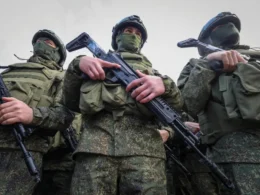The world we live in today is one where the Russian economy is slowly dying. However, Benjamin Hilgenstock, a senior economist at the Kyiv School of Economics, this is by no means enough pressure to force Russian ruler Vladimir Putin to stop the war against Ukraine, The Telegraph reports.
Despite the fact that nearly three years have passed since the start of Russia’s all-out war and the aggressor's economy is in critical condition, British and European officials believe that Western support for Ukraine must remain unwavering.
A high-ranking European security source expressed frustration that the West is not fully committed to supporting Ukraine as much as they believe it should be. They argue that if Ukraine and its allies remain resolute, Putin will face serious difficulties in two to three years.
Currently, tensions within Russia over the state of the economy are so high that Putin has begun pressuring officials over the "drought" of private investments.
This situation is also deeply concerning for Russian oligarchs. As early as 2023, aluminum magnate Oleg Deripaska warned that Russia could soon run out of money. Other high-ranking Russian officials echoed his concerns.
Additionally, Russia’s National Wealth Fund is being significantly depleted. Journalists reported that its liquid assets now amount to just $38 billion, compared to $100 billion at the start of 2022.
Moscow’s economic resilience surprised many analysts initially, but now signs of instability are emerging like never before, the report adds. Prices in Russia are rising by an average of 9.5% annually. Immediately after the beginning of the war in 2022, this figure stood at 17.8%.
The main causes of Russia’s economic troubles are its massive military expenditures, which account for more than 6% of the country’s economy, and a severe labor shortage, which will make it difficult to curb inflation.
Pressure is also mounting on Russia’s central bank to slow down its aggressive interest rate hikes. The article noted that Putin had already intervened in December, which provided some temporary relief.
Hilgenstock says that despite the situation, Moscow does not face an imminent risk of running out of money.
Research from the Kyiv School of Economics found that since 2022, Russia’s liquid assets—mainly held in yuan and gold—have decreased by 60%. It is projected that these reserves could be exhausted within two to three years.
The report adds that the remaining portion of Russia’s National Wealth Fund consists of shares in state-backed Sberbank and $40 billion in illiquid assets that cannot be easily sold if needed.
Hilgenstock believes that as long as Russia maintains control over its currency, Putin will have enough funds to continue the war against Ukraine. However, the economic consequences for Russia will be severe.
Related:
- Zelenskyy warns against Ukraine’s exclusion from US-Russia peace talks
- EU dismisses FT report on linking Russian gas transit resumption talks to potential Ukraine peace deal
- Ukraine’s wartime unity at risk as ruling party seeks to ban opposition leader Poroshenko from parliament
- Finnish President Stubb Sees ceasefire possible in Ukraine in upcoming months
- Ukrainian FM says Putin lies about his peace intentions





